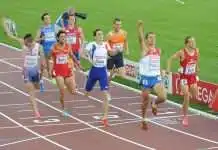- News
- Articles
- Features
- Interviews
- Events
- RT Journals
- Training
- A Column By Len Johnson
- A Column By Brett Davies
- A column by Michael Beisty
- A Column By Matt Lynch
- A Column By Jaryd Clifford
- A Column By Mark Tucker
- A Column By David McNeill
- A Column By Grace Kalac
- A Column By Daniel Quin
- A column by Jessica Trengove
- A Column By Amity Delaney
- MacDonald’s Interviews
- Reviews
- Podcast
- Members
- Login – ADDICT
- Register – ADDICT
- Home – ADDICT
- Features – ADDICT
- Video – ADDICT
- Training – ADDICT
- Training of famous runners – ADDICT
- “We will be the best” – The training & making of Jakob Ingebrigtsen
- The Training of Craig ‘Buster’ Mottram
- First Under 3:30 – The Training of Steve Cram
- “An animal” – Training of Famous Runners, Steve Jones
- 2:15.25 – The Training of Paula Radcliffe
- Three-time Olympic gold medalist – The Training of Peter Snell
- Training of Famous Runners – Rosa Mota
- Training of Famous Runners – Steve Ovett
- ‘Follow the White Hat’ – The Training of Dave Wottle
- “The marathon is my only girlfriend” – Training of famous runners: Toshihiko Seko
- Before Gregson & Mottram: The Training of Simon Doyle
- 137 Sub-4 Minute Miles – The Training of Steve Scott part 1 of 2
- 137 Sub-4 Miles – The Training of Steve Scott Part 2/2
- ‘5 Time World Cross Country Champ’- The Training of Paul Tergat
- Tactics, Salazar & Gold – The Training of Matthew Centrowitz
- ‘El Caballo’ – The Training of Alberto Juantorena
- Ignore Circuit & Weight Training at Your Peril – Lessons from Peter & Seb Coe
- Tempo Training with Alberto Salazar
- Training at an Early Age – Insights from Steve Cram, Herb Elliott, John Walker & Ron Delaney
- Australian Wonder: The Training of Cathy Freeman
- ‘A Body Built on Pain’ – The Training of Herb Elliott
- Run School
- Rankings
- Training for Road
- Training for Track
- Training for Trail
- Training For Beginners
- Gym and Strength
- Travel
- Injuries
- Barefoot Running
- Performance
- Shoe Reviews
- Best Running Books
- Workout Series
- Nutrition
- Physiotherapy
- Podiatry
- Psychology
- Legends of Athletics
- Workout Any Day Series 1
- Australian Running Calendar
- Australian Running Clubs
- Ultra
- Videos
- About RT
- Shop
© Runner's Tribe (c) 2025. Runner's Tribe is a globally Trade Marked name. Establish 2009. Contact: info@runnerstribe.com




































